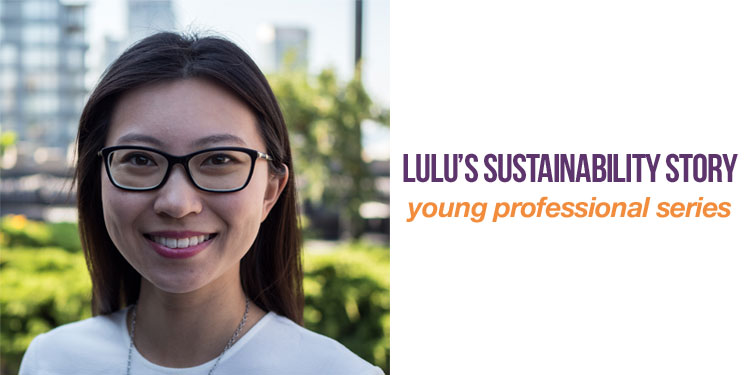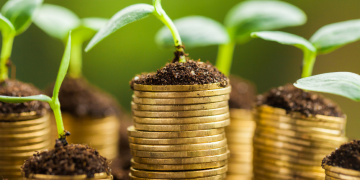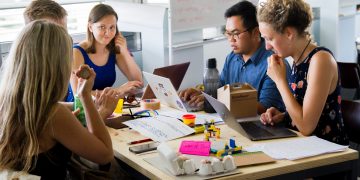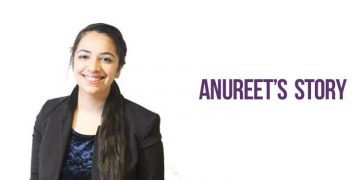Lulu Li, the Carbon Accountant at Carbon Accounting Company
5 questions with a young sustainability professional.
Lulu Li’s transformation from an oil and gas worker to a sustainability champion is inspiring. Lulu started off her young career working on site in Fort McMurray, Alberta. Witnessing oil spills and waste first hand inspired her to leave her job and pursue a career in environmental sustainability. After going back to school to get her Masters in Sustainability Management, Lulu is now a Carbon Accountant for the Carbon Accounting Company. Lulu teaches us about the cutting edge field of carbon accounting and reminds us the importance of networking and the power of mentors.
When did you know you wanted to work in the social impact field?
I worked in the oil and gas industry for three years after graduating from the University of Alberta. While working on site at Fort McMurray, I realized many construction workers don’t understand and (thus) don’t correctly follow environmental procedures. Spills are not cleaned up properly, and materials are wasted around the site. I couldn’t sit around and watch nothing improve. I needed to get out and learn how to turn things around and help these workers understand the importance of their efforts to protect the environment. That was my pivotal moment when I decided to pursue a career in sustainability.
How did you get your current social impact job?
The first thing I learned in the Master of Science in Sustainability Management (MScSM) program was the importance of networking. I attended at least two events each week. At each event, I made sure I find out challenges businesses are facing when implementing sustainability practices. I used this information to guide my studies and research. For example, knowing pricing carbon is a growing practice in Canada, I spent a year interviewing and researching to understand the challenges of implementing internal carbon price and suggested the best practices of a pricing carbon for Canadian businesses. The connections I made while conducting this research eventually led me to a job opportunities in the carbon accounting industry.
What’s a typical day like?
Half of my day is spent analyzing data, and the rest is managing client relationships. Our company is growing rapidly, and we now help municipalities and businesses with their climate change actions. My role is to analyze utility data and calculate carbon emissions based on various activities. In between crunching numbers, I interact with clients to promote the importance of data integrity and celebrate their efforts on reducing carbon footprints.
What advice would you give to someone looking to work in your field?
Everyone knows the importance of networking and adding value to your network connections. However, I find it extremely helpful to have mentors in the field you want to be in. A great mentor understands your struggles and sees potential in you. Sometimes they can offer to connect you with people in your industry, other times they are your trusted advisor on what to do in a sticky situation. I am lucky to have found three amazing mentors that guided me through the past three years.
To pass on the good deed, I also mentor students and peers to share my experience as a young sustainability professional and recent grad.
What can you identify as the biggest opportunity in your sector right now?
The obvious ones are impact investments, renewable energy, climate change strategies, and water management. I find change management and supply chain management positions are evolving to include sustainability components. These could offer amazing opportunities for those looking to get into the corporate sustainability sector.
Quickfire:
What do you think is the most important skill/quality for your field?
Most sustainability jobs require a general understanding of environmental science and business fundamentals. Communication is also important since most sustainability positions need to interact with internal and external stakeholders, and facilitate communications across multiple disciplines.
Also, I find getting creditable certifications (such as LEED, GHG-IQ etc.) help to fulfill education requirements if you don’t have a sustainability background.
What’s one thing most people wouldn’t expect to hear about working in social impact?
Your colleagues can become your best friends. It’s very likely that the people you work with share similar passion for sustainability as you do. This makes your 40 hour week much more exciting and enjoyable.
Favourite past time other than work?
When I lived in Calgary, Banff was my favourite place to spend my weekends. I loved to hike and explore with friends and family. After leaving Calgary, I became more of a foodie. My current favourite past time is to cook and explore around the GTA for food that I never tried before.
First website you visit in the morning?
On my Google App, I am subscribed to news articles related to corporate sustainability, climate change, water management, clean-tech, business innovation and impact investing. Every morning, I get a variety of news from different sources and I skim through them while making breakfast and lunch.





No Comment